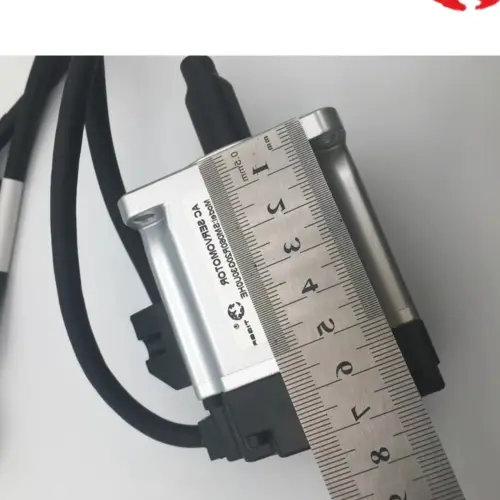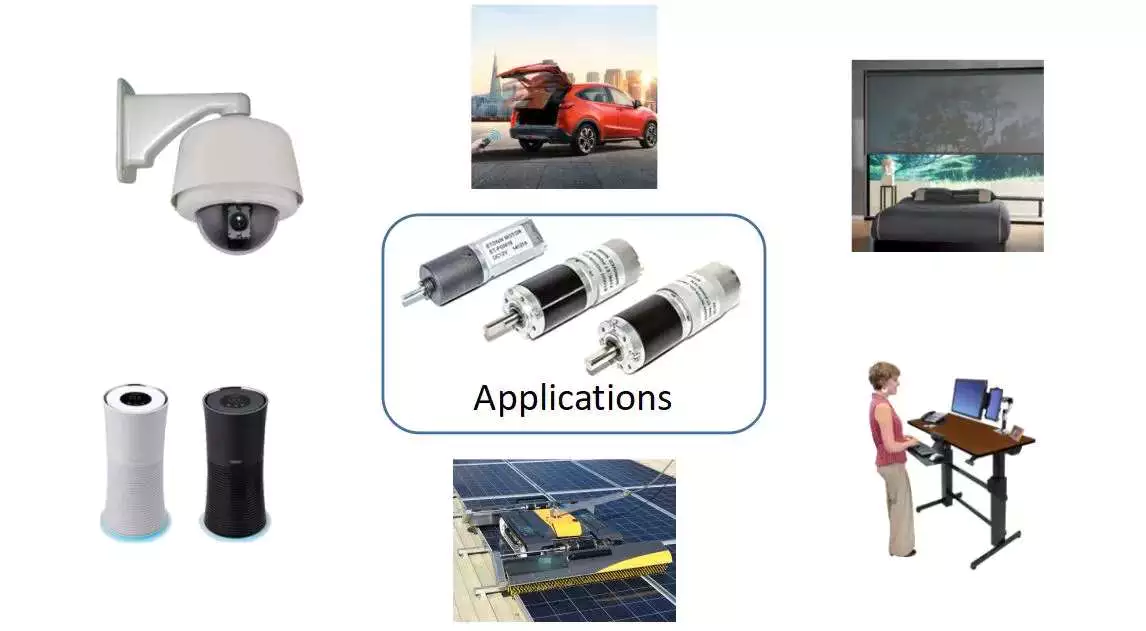
High-Quality Permanent Magnet Synchronous Servo Motor
Product Description
Our 60# 220V 200W AC Permanent Magnet Synchronous Servo Motor Without Brake is an innovative solution for high-end motor applications. It is widely used in industrial robots, AGVs, intelligent factories, CNC, and 3C, among others. The encoder can be chosen according to your requirements.
Advantages
Our motor has several advantages:
- Excellent R&D team
- Reliability First, Quality Control Management First
- Short Lead Time (Conventional products about one-week)
- Cost-effective (competitive price)
- Certification: ISO9001, CE; and our products meet RoHS requirements.
- One-year warranty (under normal use)
Product Features
The entire series adopts a 5-pair pole scheme. Compared to competitors in the same industry, the product size has a shorter advantage. The rotor adopts embedded magnetic steel, without the risk of magnetic steel falling off. Encoders can be matched with various types, and the company has its own encoder products for matching use. Compared to peers, it has supporting advantages. The appearance of the motor is available in silver and black, with a focus on black.
Technical Indicators
| Rated output power | 200 | W |
| Number of poles | 10 | P |
| rated voltage | 220 | VAC |
| Rated speed | 3000 | r/min |
| Maximum speed | 6500 | r/min |
| Rated torque | 0.64 | N.m |
| Instantaneous maximum torque | 2.23 | N.m |
| Rated Current | 1.62 | A(rms) |
| Instantaneous maximum current | 5.7 | A(rms) |
| Line back EMF | 25.2 | V/krpm |
| Torque coefficient | 0.417 | N.m/A |
| Moment of inertia | 0.3 | Kg.Sq.m.10-4 |
| Line resistance | 6.3 | ohm |
| Line inductance | 12.2 | mH |
| Brake rated voltage | without brake | VDC |
| Brake rated power | without brake | W |
| Brake static torque | without brake | N.m |
| Brake moment of inertia | without brake | Kg.Sq.m.10-4 |
| Weight | 0.8 | Kg |
| Feedback element | Optional | |
| Temperature sensor | NC |
Functional Features
| Working hours | Continuous |
| Heat resistance | Class F |
| Body color | Black |
| Cooling method | Natural cooling |
| Vibration level | V15 |
| Connection method | Direct connection |
| Installation method | Flange installation |
| Excitation method | Permanent magnet |
| Protection method | Fully enclosed ,self-cooling IP65 (except shaft penetration) |
| Rotation method | Counterclockwise rotation(CCW) as seen from the extension end of the motor shaft |
Outside View

Dimensions

Model Explanation
Please refer to the product name for model explanation.
Servo Motor Wiring Definition

Frequently Asked Questions
1. What applications is this motor suitable for?
Our motor is widely used in industrial robots, AGVs, intelligent factories, CNC, and 3C, among others.
2. What certifications does your product have?
Our product is certified by ISO9001, CE, and meets RoHS requirements.
3. What is the warranty period for this motor?
Our motor comes with a one-year warranty (under normal use).
4. Can I customize the encoder?
Yes, you can choose the encoder according to your requirements, and we also have our own encoder products for matching use.
5. What is the lead time for this motor?
Our conventional products have a lead time of about one week.
About Our Company
Our company mainly supplies various industrial products such as agricultural gearboxes, power output shafts, sprockets, hydraulic couplings, worm gear reducers, racks, roller chains, pulleys, planetary gearboxes, timing pulleys, bushings, etc. We pride ourselves on high-quality products, preferential prices, and thoughtful services. Customers are welcome to customize with drawings and samples.

Performance Characteristics of Servo Motor
– High Precision: Servo motors offer precise control and positioning, ensuring accurate movements in various applications.
– Fast Response: Servo motors have quick response times, allowing for rapid adjustments and precise positioning.
– High Torque: Servo motors can generate high torque output, enabling them to handle heavy loads with ease.
– Wide Speed Range: Servo motors can operate at varying speeds, making them suitable for applications that require different speed levels.
– Excellent Stability: Servo motors provide stable performance, maintaining position accuracy even in dynamic operating conditions.
– Smooth Operation: Servo motors offer smooth and precise motion control, reducing vibrations and ensuring smooth operation.
Types and Characteristics of Servo Motor
There are various types of servo motors available, each with its own unique characteristics:
– AC Servo Motors: AC servo motors are known for their high torque and excellent speed control.
– DC Servo Motors: DC servo motors are compact and offer quick response times, making them suitable for applications with limited space.
– Brushless Servo Motors: Brushless servo motors eliminate the need for brushes, resulting in low maintenance and longer lifespan.
– Linear Servo Motors: Linear servo motors provide linear motion, making them ideal for applications that require precise positioning along a straight path.
– Hybrid Servo Motors: Hybrid servo motors combine the benefits of stepper motors and servo motors, offering improved performance and control.
Advantages of Servo Motor Made of Different Materials
– Servo Motors with Aluminum Housing: Aluminum servo motors are lightweight, durable, and have excellent heat dissipation properties.
– Servo Motors with Stainless Steel Housing: Stainless steel servo motors are corrosion-resistant, making them suitable for harsh environments.
– Servo Motors with Plastic Housing: Plastic servo motors are cost-effective and lightweight, making them ideal for applications with weight restrictions.

Application of Servo Motor
Servo motors find extensive use in various industries:
– Industrial Automation: Servo motors play a crucial role in industrial automation systems, providing precise control and motion.
– Aerospace: Servo motors are employed in aerospace applications for their reliability and precise positioning capabilities.
– Automotive: Servo motors are used in automotive systems for applications such as power steering, throttle control, and braking systems.
– Medical Equipment: Servo motors are utilized in medical equipment for precise movements, such as robotic surgery systems and patient positioning.
– Consumer Electronics: Servo motors are found in consumer electronics devices, including cameras, drones, and home automation systems, for accurate control and positioning.
Future Development Trends and Opportunities
The servo motor industry is expected to witness the following trends and opportunities:
– Increased Demand for Miniature Servo Motors: As technology advances, the demand for smaller and more precise servo motors will rise.
– Growing Application in Robotics: With the increasing use of robotics in various industries, servo motors will play a vital role in robotic motion control.
– Integration with IoT: Servo motors integrated with IoT technology will enable remote monitoring and control, enhancing efficiency and productivity.
– Energy Efficiency: Future servo motors will focus on energy efficiency, reducing power consumption without compromising performance.
– Advancements in Control Algorithms: Improved control algorithms will lead to enhanced motion control and better performance of servo motors.
Choosing a Suitable Servo Motor
When selecting a servo motor, consider the following aspects:
– Power Requirements: Determine the power input and voltage requirements based on your application.
– Speed: Assess the required speed range and select a servo motor that can operate within that range.
– Torque: Consider the load requirements and choose a servo motor with sufficient torque output.
– Efficiency: Opt for a servo motor with high energy efficiency to minimize power consumption.
– Operating Environment: Evaluate the environmental conditions, such as temperature and humidity, and select a servo motor that can withstand them.
– Motor Type: Choose the appropriate type of servo motor based on your specific application requirements.
In conclusion, servo motors offer precise control, fast response, and high torque for various applications. Understanding their performance characteristics, types, and advantages in different materials is essential for selecting the right servo motor. Their widespread application in industries like industrial automation, aerospace, automotive, medical equipment, and consumer electronics highlights their significance. With the future trends and opportunities, servo motors are poised to continue playing a crucial role in the field of automation and robotics. Consider the power requirements, speed, torque, efficiency, operating environment, and motor type when choosing a suitable servo motor for your application.
Author: Dream